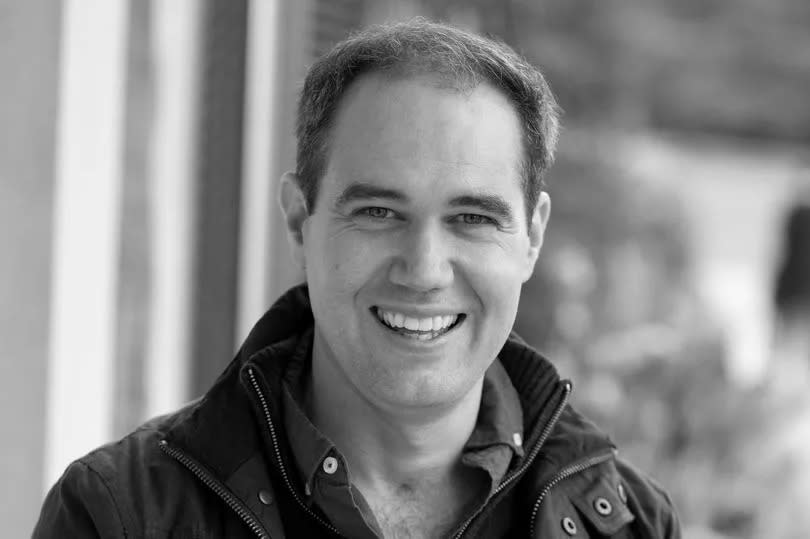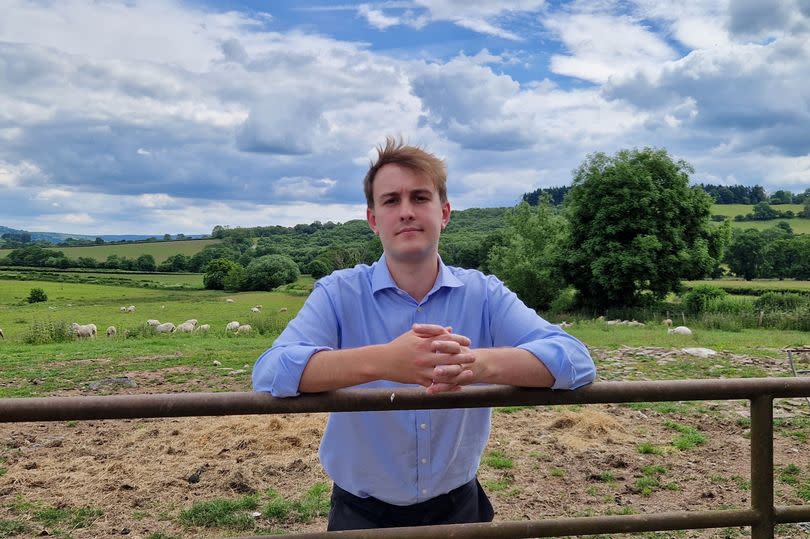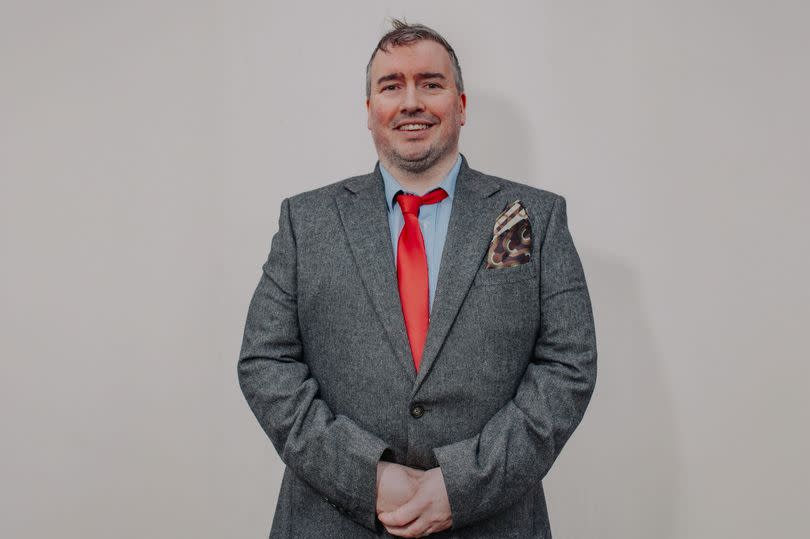General election 2024: Find out more about the candidates standing in Montgomeryshire and Glyndwr

The newly-created Montgomeryshire and Glyndwr will take on two areas which are both currently Conservative-held. It is one of two seats, one poll predicts the Conservatives will hold at the next election.
It will be made up of all the existing Montgomeryshire seat and 46.6% of Clywd South. The boundaries of all but one Welsh seat have changed ahead of the 2024 election, only Ynys Mon (the island of Anglesey) remains untouched, all others have seen changes which could impact the results on election night. You can read the background to the changes here.
Instead of 40 constituencies, there are now 32 in Wales and the idea behind it is to make all Westminster constituencies the same size. There are six candidates seeking election this time.
READ MORE: What is my general election 2024 constituency - as 90% of areas hit by boundary changes
READ MORE: UK general election postal vote details including how to register and how it works
Where does the constituency cover?
It includes Newtown, Caersws, Trewern and Llansantffraid.
You can also find your constituency by entering your postcode here:
What happened in the general election in 2019
Who is standing?
Jeremy David Brignell-Thorp (Green Party)
Oliver Lewis (Reform UK)
Glyn Preston (Lib Dem)
Elwyn Vaughan (Plaid Cymru)
Craig Williams (Conservative, without party backing)
Steve Witherden (Labour)
The candidates
All candidates were all asked to answer the same questions, the responses received are all below:
Oliver Lewis, Reform UK

I am 37 and one of four siblings. I was born in Oxford and grew up north of there; but my father's father was Welsh, and the Welsh side of my family speak Welsh as their mother tongue. I have lived in Montgomery for six years, where I came to write the manuscript for my first book 'The Orwell Tour: Travels Through the Life and Work of George Orwell'. I am a travel writer part-time, but my main preoccupation is academia, where I am reading for a Doctorate in British History. I teach History and Politics at my home university - Oxford - and also at SciencesPo in Paris, approximate to a French version of the LSE. Prior to this I worked in financial services, but hated office life and feel much better suited to a 'portfolio' career. My hobbies are (unsurprisingly!) reading, writing and travelling.
Name a policy you wish to see enacted
Whistle blowers in both the private and public sectors face the same common treatment: marginalisation, and then displacement. The law, on paper at least, is strong; my experience is that in practice, it is weak. Many people think that HR departments are there to protect employees. They aren't. They exist to protect the company. 'Bad apple managers' hide behind corporate liability and thus virtually unlimited resources. Instead, I would move liability to the manager. Any manager in any organisation where bullying is provable will become personally liable in law. All it would take is one or two convictions, and the culture of British work places would I think change very quickly.
What's the biggest issue facing Wales?
The biggest issue facing Wales has to be secondary education. Wales has the worst secondary education system in Britain by some margin. Secondary school buildings are generally of low-quality, and outcomes across the attainment range compare badly to England, Scotland and Northern Ireland. Traditionally, this was never the case - Wales' secondary schools, and particularly its grammar schools, were a 'net exporter' of teachers to the rest of the UK.
Improving our secondary schools' buildings and the level of attainment of pupils has to be the number one priority for all politicians in Wales. I would favour the creation of specialist vocational schools which pupils could join at, say, age 13 and pursue any number of options in the skilled trades. These would have to be generously funded and created in collaboration with communities and business across Wales, so that our schools can provide the skilled workers our industries need.
Who has been the best British Prime Minister and why?
The best British Prime Minister has I think to be Clement Attlee. I studied his method of government closely as an undergraduate and it never left me; close, diligent analysis of the evidence before him and 'making calls' which were often very difficult but which in the long term proved to be in the national interest. He was a patriot who loved his country, and worked very hard in the impossible circumstances of 1945-51, after an economically devastating war, to place Britain on a firmer footing for the future.
He had integrity, was a good judge of character, and possessed a range of life experiences which meant his decision-making was rooted in a sort of intellectually-honest 'common sense', a hallmark of his Englishness. He had a capable, understated style of leadership, and was not ‘politically tribal’ in the conventional way. We can learn a lot from him.
Glyn Preston - Liberal Democrats

I was born and grew up in Llandinam where I attended the Welsh language stream of Ysgol Uwchradd Llanidloes. I am now lucky enough to represent the town of Llanidloes on Powys County Council.
I am passionate about the area I’m from, whether it’s the amazing natural scenery, its history or its kind people, I’ve experienced the very best of Montgomeryshire & Glyndwr.
But I’ve also seen our area ignored and forgotten about time and time again by those in power, whether that’s by Labour in Cardiff Bay or the Conservatives in Westminster. It was this misunderstanding and neglect of rural communities like ours that inspired me to stand for election for our local council and now to be our local MP. Rural communities need a strong independent voice rather than a cog in a large party machine to bang the drum for further investment.
Name a policy you want to see become law if elected as an MP
A statutory right to be able to GP within seven days is a key part of the Liberal Democrat manifesto. In some parts of Montgomeryshire & Glyndwr people are waiting 5 weeks or longer for a GP appointment. There is no way in which this is justifiable. By that point, people have either got better by themselves or deteriorated to the point of needing to go to A&E and it is for this reason our A&E departments are overwhelmed. We need more services in our local communities with a huge number of people in our constituency having to travel hours to Shrewsbury or Telford in England for treatment.
To fix this we would introduce a rural GP payment, which would help attract and keep GPs in rural communities.
What is the biggest issue facing Wales and what will you do to fix it?
In my part of Wales, depopulation is a massive issue. It’s not often talked about but thousands of young people are leaving Powys each year. This has a massive domino effect on public services. The fewer young people there are in the constituency the fewer taxpayers are in the constituency to support local services, meaning they cut. Then as services get cut, even more people move out of the area, it’s a real cycle of decline.
Fixing it isn’t simple but bringing new investment in is vital. We need good quality jobs for young people and accessible housing to support them. Transport links also need to be improved. The Liberal Democrats have set out plans to reverse the Welsh Government cuts to rural bus services and their planned cuts to the Cambrian Line rail services.
We also need to ensure everyone has access to gigabit broadband. Local entrepreneurs need to be able to take advantage of changing working habits. People moving out of cities to rural areas offers our towns and communities a real chance at rejuvenation if we have the tools to take advantage of it.
Who has been the best British Prime Minister and why?
Well, I think I wouldn’t be a very good Liberal Democrat if I gave a Conservative or Labour answer, instead, I will say Paddy Ashdown was the best Prime Minister we never had.
Elywn Vaughan - Plaid Cymru

I’ve got deep roots in the area. I was born and raised in Montgomeryshire, and have served as a county councillor on Powys County Council since 2017. I’ve been active with a number of environmental campaigns including plastic protests in Tesco stores and ensuring Powys County council supported a motion calling for a climate emergency.
I come from an extensive Montgomeryshire farming family and went to Ysgol Bro Ddyfi, Machynlleth.
It is a privilege to be selected as candidate for Montgomeryshire. As the keepers of the old radical Welsh liberal tradition of Cymru Fydd, I want to focus on not only the environmental challenges, but the sustainability of our communities and ensuring a entrepreneurial spirit within Montgomeryshire.
I want to be a voice for rural Wales, one that understands our communities, it’s challenges and opportunities and putting those communities first. e want to create a commonality of minds in the area and invite those from the old liberal tradition and others to join with me in our endeavours. Strength in unity.”
Name a policy you want to see become law if elected as an MP
Amendment of the Barnett formula to ensure Wales gets the funds it should. Lord Barnett wanted this changing in the 1970's and we're still waiting for our fair share.
What's the biggest issue facing Wales and what will you do to fix it?
Biggest issue for Wales is the dire state of our public services with both NHS and public authorities facing huge financial pressures. That is why it's imperative that the Barnett formula is changed and fairness of funding is given to Wales.
Who has been the best British Prime Minister and why?
Who has been the best British PM? As one that believes the British state has failed our communities, has led to the huge gap between rich and power in society, has decimated our now post industrial communities, has led to rural depopulation, high cost of housing and lack of economic opportunities it seems the Prime Ministers s have failed and hence we need a radical overhaul of the democratic institutions in the Islands.
Steve Witherden - Labour

I was born in Wrexham, grew up in Llantysilio and Llangollen and have lived in Acrefair for 15 years. I studied at Lampeter and Aberystwyth University. I have always lived in Mid and North Wales; my father came to the area in the 1970s as a founding member of the Centre for Alternative Technology in Machynlleth.
I married my wife, an NHS worker, 14 years ago. We have two children who attend local state schools in the constituency. I have been a teacher in Wrexham for 18 years while also holding elected roles in my union: Workplace Rep (2009); County Secretary (2015); National Executive (2020); and Cymru President (2021-22).
My teaching job, trade union and Labour Party roles alongside having a young family unfortunately doesn’t leave much time for hobbies. When I was younger and fitter I loved football and rugby – now walking our dog is my main form of exercise!
Name a policy you want to see become law if elected as an MP
The "New deal for working people" contains a whole raft of legislation that I would like to see enacted, from banning the practice of fire and rehire to ending exploitative zero-hours contracts.
Being one of four elected National Executive Members for Wales in my union role has given me a better understanding of how the Labour Party was founded through the rise of the Trade Union Movement. Labour was created to protect working people from exploitation and impoverishment at the hands of rapacious and ruthless employers, that had grown rich off the back of the labour of working people.
When you see the effects of the cost-of-living crisis and child poverty with your own eyes, it is glaringly obvious that the Labour Party and its founding purpose is as relevant today – and as urgently needed – as it has ever been.
What's the biggest issue facing Wales and what will you do to fix it?
Sadly, there are currently multiple, very serious issues facing Wales. One thing that could fix a lot of these problems, however, is the Green New Deal. The cost-of-living crisis is being driven by the continually rising prices of basic needs – one of the biggest of course being energy and utility bills.
Whilst we all get poorer, super-rich fossil fuel multinational companies pocket record-breaking profits. The Green New Deal would set up Great British Energy, creating jobs in Wales via the vast expansion of renewable energy sources, be publicly owned (so no profiteering at our expense); and ease the cost-of-living crisis by creating cheap, homegrown power. This will see us become less dependent on authoritarian regimes for fossil fuels and help to save our planet from the devastating impacts of climate change.
Who has been the best British Prime Minister and why?
Charles Grey. As Leader of the House of Commons in 1807, he passed the legislation that banned Britain's involvement in the transatlantic slave trade. As Prime Minister in the 1830s, he abolished slavery in the British Empire (over thirty years before the Americans and without a bloody civil war to boot) and gave the vote to sixteen-times more people than prior to him taking office.
He also ended the undemocratic and corrupt "Rotten Boroughs and Pocket Boroughs". He did all this in half the time of David Cameron’s tenure.

 Yahoo News
Yahoo News 
